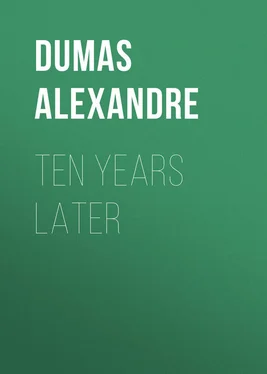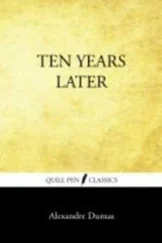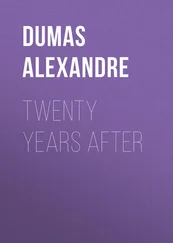Alexandre Dumas - Ten Years Later
Здесь есть возможность читать онлайн «Alexandre Dumas - Ten Years Later» — ознакомительный отрывок электронной книги совершенно бесплатно, а после прочтения отрывка купить полную версию. В некоторых случаях можно слушать аудио, скачать через торрент в формате fb2 и присутствует краткое содержание. Жанр: literature_19, foreign_antique, foreign_prose, на английском языке. Описание произведения, (предисловие) а так же отзывы посетителей доступны на портале библиотеки ЛибКат.
- Название:Ten Years Later
- Автор:
- Жанр:
- Год:неизвестен
- ISBN:нет данных
- Рейтинг книги:4 / 5. Голосов: 1
-
Избранное:Добавить в избранное
- Отзывы:
-
Ваша оценка:
- 80
- 1
- 2
- 3
- 4
- 5
Ten Years Later: краткое содержание, описание и аннотация
Предлагаем к чтению аннотацию, описание, краткое содержание или предисловие (зависит от того, что написал сам автор книги «Ten Years Later»). Если вы не нашли необходимую информацию о книге — напишите в комментариях, мы постараемся отыскать её.
Ten Years Later — читать онлайн ознакомительный отрывок
Ниже представлен текст книги, разбитый по страницам. Система сохранения места последней прочитанной страницы, позволяет с удобством читать онлайн бесплатно книгу «Ten Years Later», без необходимости каждый раз заново искать на чём Вы остановились. Поставьте закладку, и сможете в любой момент перейти на страницу, на которой закончили чтение.
Интервал:
Закладка:
Malicorne made a movement, to indicate that upon this subject he was as ignorant as the count himself. “Why does he not make use of his credit, then?” continued De Guiche.
“With regard to that, I think – ”
“What?”
“That Manicamp has credit with no one but yourself, monsieur le comte!”
“He will not be at Le Havre, then?” Whereupon Malicorne made another movement.
“But every one will be there.”
“I trust, monsieur le comte, that he will not neglect so excellent an opportunity.”
“He should be at Paris by this time.”
“He will take the direct road perhaps to make up for lost time.”
“Where is he now?”
“At Orleans.”
“Monsieur,” said De Guiche, “you seem to me a man of very good taste.”
Malicorne was wearing some of Manicamp’s old-new clothes. He bowed in return, saying, “You do me a very great honor, monsieur le comte.”
“Whom have I the pleasure of addressing?”
“My name is Malicorne, monsieur.”
“M. de Malicorne, what do you think of these pistol-holsters?”
Malicorne was a man of great readiness and immediately understood the position of affairs. Besides, the “de” which had been prefixed to his name, raised him to the rank of the person with whom he was conversing. He looked at the holsters with the air of a connoisseur and said, without hesitation: “Somewhat heavy, monsieur.”
“You see,” said De Guiche to the saddler, “this gentleman, who understands these matters well, thinks the holsters heavy, a complaint I had already made.” The saddler was full of excuses.
“What do you think,” asked De Guiche, “of this horse, which I have just purchased?”
“To look at it, it seems perfect, monsieur le comte; but I must mount it before I give you my opinion.”
“Do so, M. de Malicorne, and ride him round the court two or three times.”
The courtyard of the hotel was so arranged, that whenever there was any occasion for it, it could be used as a riding-school. Malicorne, with perfect ease, arranged the bridle and snaffle-reins, placed his left hand on the horse’s mane, and, with his foot in the stirrup, raised himself and seated himself in the saddle. At first, he made the horse walk the whole circuit of the court-yard at a foot-pace; next at a trot; lastly at a gallop. He then drew up close to the count, dismounted, and threw the bridle to a groom standing by. “Well,” said the count, “what do you think of it, M. de Malicorne?”
“This horse, monsieur le comte, is of the Mecklenburg breed. In looking whether the bit suited his mouth, I saw that he was rising seven, the very age when the training of a horse intended for a charger should commence. The forehand is light. A horse which holds its head high, it is said, never tires his rider’s hand. The withers are rather low. The drooping of the hind-quarters would almost make me doubt the purity of its German breed, and I think there is English blood in him. He stands well on his legs, but he trots high, and may cut himself, which requires attention to be paid to his shoeing. He is tractable; and as I made him turn round and change his feet, I found him quick and ready in doing so.”
“Well said, M. de Malicorne,” exclaimed the comte; “you are a judge of horses, I perceive;” then, turning towards him again, he continued, “you are most becomingly dressed, M. de Malicorne. That is not a provincial cut, I presume. Such a style of dress is not to be met with at Tours or Orleans.”
“No, monsieur le comte; my clothes were made at Paris.”
“There is no doubt about that. But let us resume our own affair. Manicamp wishes for the appointment of a second maid of honor.”
“You perceive what he has written, monsieur le comte.”
“For whom was the first appointment?”
Malicorne felt the color rise in his face as he answered hurriedly.
“A charming maid of honor, Mademoiselle de Montalais.”
“Ah, ah! you are acquainted with her?”
“We are affianced, or nearly so.”
“That is quite another thing, then; a thousand compliments,” exclaimed De Guiche, upon whose lips a courtier’s jest was already fitting, but to whom the word “affianced,” addressed by Malicorne with respect to Mademoiselle de Montalais, recalled the respect due to women.
“And for whom is the second appointment destined?” asked De Guiche; “is it for anyone to whom Manicamp may happen to be affianced? In that case I pity her, poor girl! for she will have a sad fellow for a husband.”
“No, monsieur le comte; the second appointment is for Mademoiselle de la Baume le Blanc de la Valliere.”
“Unknown,” said De Guiche.
“Unknown? yes, monsieur,” said Malicorne, smiling in his turn.
“Very good. I will speak to Monsieur about it. By the by, she is of gentle birth?”
“She belongs to a very good family and is maid of honor to Madame.”
“That’s well. Will you accompany me to Monsieur?”
“Most certainly, if I may be permitted the honor.”
“Have you your carriage?”
“No; I came here on horseback.”
“Dressed as you are?”
“No, monsieur; I posted from Orleans, and I changed my traveling suit for the one I have on, in order to present myself to you.”
“True, you already told me you had come from Orleans;” saying which he crumpled Manicamp’s letter in his hand, and thrust it in his pocket.
“I beg your pardon,” said Malicorne, timidly; “but I do not think you have read all.”
“Not read all, do you say?”
“No; there were two letters in the same envelope.”
“Oh! are you sure?”
“Quite sure.”
“Let us look, then,” said the count, as he opened the letter again.
“Ah! you are right,” he said opening the paper which he had not yet read.
“I suspected it,” he continued – “another application for an appointment under Monsieur. This Manicamp is a regular vampire: – he is carrying on a trade in it.”
“No, monsieur le comte, he wishes to make a present of it.”
“To whom?”
“To myself, monsieur.”
“Why did you not say so at once, my dear M. Mauvaisecorne?”
“Malicorne, monsieur le comte.”
“Forgive me; it is that Latin that bothers me – that terrible mine of etymologies. Why the deuce are young men of family taught Latin? Mala and mauvaise – you understand it is the same thing. You will forgive me, I trust, M. de Malicorne.”
“Your kindness affects me much, monsieur: but it is a reason why I should make you acquainted with one circumstance without any delay.”
“What is it?”
“That I was not born a gentleman. I am not without courage, and not altogether deficient in ability; but my name is Malicorne simply.”
“You appear to me, monsieur!” exclaimed the count, looking at the astute face of his companion, “to be a most agreeable man. Your face pleases me, M. Malicorne, and you must possess some indisputably excellent qualities to have pleased that egotistical Manicamp. Be candid and tell me whether you are not some saint descended upon the earth.”
“Why so?”
“For the simple reason that he makes you a present of anything. Did you not say that he intended to make you a present of some appointment in the king’s household?”
“I beg your pardon, count; but, if I succeed in obtaining the appointment, you, and not he, will have bestowed it on me.”
“Besides he will not have given it to you for nothing, I suppose. Stay, I have it; – there is a Malicorne at Orleans who lends money to the prince.”
“I think that must be my father, monsieur.”
“Ah! the prince has the father, and that terrible dragon of a Manicamp has the son. Take care, monsieur, I know him. He will fleece you completely.”
Читать дальшеИнтервал:
Закладка:
Похожие книги на «Ten Years Later»
Представляем Вашему вниманию похожие книги на «Ten Years Later» списком для выбора. Мы отобрали схожую по названию и смыслу литературу в надежде предоставить читателям больше вариантов отыскать новые, интересные, ещё непрочитанные произведения.
Обсуждение, отзывы о книге «Ten Years Later» и просто собственные мнения читателей. Оставьте ваши комментарии, напишите, что Вы думаете о произведении, его смысле или главных героях. Укажите что конкретно понравилось, а что нет, и почему Вы так считаете.












